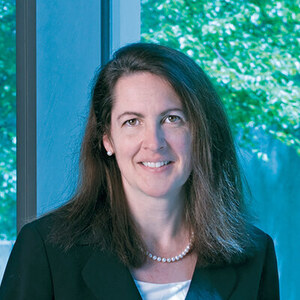Reilly Award Seminar Lecture: "Defect Propelled Swimming and Interactions of Nematic Colloids for Microrobotics" by Kathleen J. Stebe

Abstract
Nematic liquid crystals (NLCs) are highly non-linear fluids that have elastic responses that resist nematogen rearrangement and high-energy defect sites at which nematogen order is lost. Generally, the field of nematic colloids seeks to develop control over these elastic responses and defect structures to tailor colloidal interactions. We have been studying ferromagnetic disk colloids rotated by an in-plane magnetic field in nematic liquid crystals. The disk diameter and rotation rate are sufficiently slow that colloid inertia is negligible. In Newtonian fluids, these colloids rotate without translation. However, in NLC, the colloids’ anisotropic defect structure and the NLC’s elastic response generate broken symmetries that propel colloid translation. For patchy, rough colloids, a defect loop which forms on the disk undergoes periodic defect pinning, release, and contraction.
This periodic defect motion generates a swim stroke that powers colloidal swimming. Changes in defect configuration with rotation rate provide a steering mechanism. In addition to this swimming motion, colloid shape and surface chemistry generate long-ranged emergent interactions with neighboring passive colloids in quasi-static settings.
Furthermore, the non-linear response of the nematic fluid host allows pair interactions among rotating disks that differ strikingly in range and form from their static counterparts. These interactions provide a rich toolkit for reconfigurable materials assembly and open important fundamental questions regarding swimming at low Reynolds number in NLC.
Biography
Kathleen J. Stebe is the Richer & Elizabeth Goodwin Professor of Chemical and Biomolecular Engineering and Mechanical Engineering and Applied Mechanics in the School of Engineering and Applied Sciences at the University of Pennsylvania. Educated at the City College of New York, she received a B.A. in economics and a Ph.D. in chemical engineering at the Levich Institute advised by Charles Maldarelli.After a post-doctoral year in Compiegne, France under the guidance of Dominique Barthes-Biesel, she joined the Department of Chemical Engineering at Johns Hopkins University, where she became professor and served as the department chair. Thereafter, she joined the University of Pennsylvania, where she served in various administrative capacities including department chair and deputy dean.
She has been recognized by the National Academy of Engineering, the American Academy of Arts and Sciences, the Johns Hopkins Society of Scholars, and as a Fellow of the American Physical Society and of the Radcliffe Institute. Kathleen is active in APS Division of Soft Matter Physics, and the ACS Division of Colloids and Surfaces, as well as the AIChE. Her research focuses on directed assembly in soft matter and at fluid interfaces, with an emphasis on confinement, geometry, and emergent structures in far from equilibrium settings for novel functional materials.